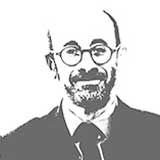LEADERSHIP IN A PANDEMIC
This period in time is rife with extraordinary circumstances. In the near future, we will surely look back and reexamine everything from multiple angles, ensuring we learn lessons wherever we can. In a few years time, many ideas and theories will surely be developed, but there will be one key shortcoming: A lack of direct experience. Nothing can replace first-hand interaction with the raw nature of our unbelievable and harrowing circumstances. The COVID-19 pandemic has several distinct elements that make it exceptional: It is global, it is closely connected to people’s health, it spurs interest in the common good, and it has completely transformed our social and professional environment.
The single most important factor for any organization’s crisis response and evolutionary success is its leadership profile. Thus, all companies’ main concerns should now include the following question: At any given time, how effective is our leadership profile on each organizational level? The difficulty is that this question cannot be answered easily with a needle on a gauge or number on a tracker.
Today’s exceptional circumstances have forced us to constantly reinvent all existing crisis management mechanisms, urgently and unavoidably. For example, the pandemic’s global nature has led to consistent difficulty focusing efforts on specific geographical or functional areas. Significant resource dispersal is therefore necessary, leading to the sudden and impactful decentralization of management. This crisis is a perfect storm, necessitating frequent and prompt responses from leaders at all levels of the organization. It is up to them to chart a course for transformation
And that course is harder to chart than ever due to serious public health concerns. People’s health, as well as their anxieties regarding their future health, are constantly in flux, only worsened by incomplete information regarding the virus. As a result, standard protocol for economic rationality assessment requires speedy recalibration at the risk of losing accuracy to complicating, subjective elements.
In recent times, a series of social restrictions have only complicated the task of transforming work environments. Lockdowns, feelings of social claustrophobia, new and intensified pressure from teleworking, and widespread uncertainty and fear about the future all run rampant, creating an atmosphere in which emotional responses can influence decision making more strongly than ever.
Consequently, organizations are facing several common challenges: A highly dynamic framework, decentralized decision-making processes, increased emphasis on distributed leadership, and uncertainty regarding the efficacy of normal oversight and assessment mechanisms. All this leads to an increase in emotional biases.
Organizations must react to these circumstances swiftly and effectively. A good first step is a full review of existing crisis protocols. Such protocols are usually founded on the existence of special management committees, formed of representatives from each area of the company. However, that alone is insufficient. It is essential to ensure that no matter when or where a challenge should arise, a leader with an effective profile is there to assist in the response.
In this regard, I can name three particularly important leadership characteristics. First, a capacity for self-criticism, allowing them to recognize any of their own potential emotional biases when analyzing situations and making decisions, as well as engendering a healthy sense of caution. Second, a mind geared toward agile decision-making networks, ideally consisting of benchmark individuals from each department, each with their ownprofiles. Third, a propensity toward strong but participatory leadership, characterized by approachability and empathy. Encouraging autocratic or bureaucratic leadership during such exceptional situations can lead to significant risks.
By following the above guidelines, the organization’s risk profile can be significantly diminished, converting the decision-making process into a shared, analytical process, one with a spotlight on the role of leadership while still allowings for collective participation and reflection. The goal is to develop committees of leaders able to utilize teamwork to neutralize any biases affecting their decision-making processes.
This focus on integration, empathy, and confidence must therefore be made clear to critical stakeholders as quickly and proactively as possible. Our entire business environment is subject to constant change, so maintaining relationships through open communication will prove essential for incorporating partner entities into our decision making. As a bonus, these efforts provide a unique opportunity to strengthen reputational bonds.
If these measures are enacted effectively, leaders can enhance the reputations and identities of not only their own companies, but also of all those they maintain relationships with. An effective leader will thus bring the industry closer together, which is paramount in times of isolation such as these. If we represent and promote shared interests, projecting the sentiment that “we’re all in this together and we’ll all come out the other side together,” the company and its reputation will be all the stronger for it. Cultivating a “we/us” mindset and fostering shared attitudes of resilience and hope will enable all members of the organization to overcome hardships born of uncertainty. This is key to securing the company’s place in the future.
